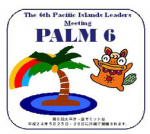Leaders of 16 Pacific island countries gathered at the Sixth Pacific Islands Leaders Meeting (PALM 6) to discuss opportunities for cooperation with regards to national disaster response, environment and climate change, sustainable development and more.
Held concurrently with PALM 6 was the Eco-Island Symposium, addressing water management and conservation, renewable energy and waste management and recycling.
 1 June 2012: Leaders at the Sixth Pacific Islands Leaders Meeting (PALM 6), representing 15 Pacific Island Forum (PIF) countries, discussed ways to build relationships and enhance cooperation with Japan. They focused on responses to natural disasters, environmental issues and climate change, sustainable development and human security, people-to-people exchanges and maritime issues. PALM 6 took place in Okinawa, Japan, from 25-26 May 2012.
1 June 2012: Leaders at the Sixth Pacific Islands Leaders Meeting (PALM 6), representing 15 Pacific Island Forum (PIF) countries, discussed ways to build relationships and enhance cooperation with Japan. They focused on responses to natural disasters, environmental issues and climate change, sustainable development and human security, people-to-people exchanges and maritime issues. PALM 6 took place in Okinawa, Japan, from 25-26 May 2012.
Events held concurrently with PALM 6 included, among others: a Journalist Invitation Program; the Pacific Islands Exhibition and Festa; a Japan and International Renewable Energy Agency (IRENA) workshop on renewable energy development in the Pacific islands; and the Eco-Island Symposium, which brought together delegates from Pacific countries to share their experiences in the areas of water management and conservation, renewable energy and waste management and recycling. The Summit had the theme, “We are all Islanders,” and highlighted shared environmental challenges on the island of Okinawa and various Pacific countries.
During PALM 6, the Prime Minister of Japan, Yoshihiko Noda, announced that the Government of Japan would offer assistance of up to US$500 million to Pacific island countries over the next three years, as stated in the “Okinawa ‘Kizuna’ Declaration.”
Regarding the upcoming UN Conference on Sustainable Development (UNCSD, or Rio+20), leaders expressed hope for substantive outcomes on the transition to green economy and recognized the significant global value and contribution of the Pacific Ocean to sustainable development.
Leaders also highlighted the importance of renewable energy and energy efficiency for reducing greenhouse gas (GHG) emissions as well as for achieving sustainable development, and underlined the importance of PIF countries’ (FICs) diversifying their energy sources and reducing their dependence on imported fuels. Prime Minister Noda expressed his commitment to the Small Island Developing States Sustainable Energy Initiative (SIDS-DOCK). The Leaders expressed appreciation and stressed the importance of Japan’s support for related efforts in the region with a view to increasing energy security for FICs.
On oceans, leaders commended PIF’s efforts in developing the “Pacific Oceanscape” as an integral component of the Pacific Regional Oceans Policy. They looked forward to strong outcomes on these matters in Rio+20. They also underlined the importance of the UN Convention on the Law of the Sea (UNCLOS) and its relevant Implementing Agreements reflecting the principal legal framework with regard to maritime order.
PALM is a summit-level meeting held every three years since 1997 with the goal of building cooperative relationships between Japan and Pacific island countries. The PIF countries represented this year were: Australia, Cook Islands, Federated States of Micronesia, Kiribati, Nauru, New Zealand, Niue, Palau, Papua New Guinea, Republic of the Marshall Islands, Samoa, Solomon Islands, Tonga, Tuvalu and Vanuatu.
A Ministerial Interim Meeting is planned for 2013 to monitor and evaluate the implementation of the key PALM 6 outcomes, and PALM 7 will take place in Japan in 2015. [PALM 6 Press Release] [Okinawa “Kizuna” Declaration] [SPREP Press Release on Ec0-Island Symposium]